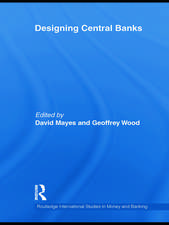Reframing Europe's Future: Challenges and failures of the European construction: Routledge Advances in European Politics
Editat de Jody Jensen, Ferenc Miszlivetzen Limba Engleză Hardback – 16 sep 2014
This book addresses the challenges and failures of the European construction today from an interdisciplinary perspective. It seeks to identify the deeper, structural causes of the failure of the European project by investigating a variety of aspects, placing Europe in a historical perspective and interpreting its trajectory in a global context. In doing so it argues that the EU, the unfinished European polity, the single European market, and the set of supranational institutions, are not sustainable in their present forms.
This text will be of key interest to students and practitioners of international relations, economics, European studies, democracy and contemporary European and global challenges.
Din seria Routledge Advances in European Politics
-
 Preț: 324.96 lei
Preț: 324.96 lei -
 Preț: 311.41 lei
Preț: 311.41 lei -
 Preț: 324.87 lei
Preț: 324.87 lei -
 Preț: 364.22 lei
Preț: 364.22 lei -
 Preț: 137.51 lei
Preț: 137.51 lei -
 Preț: 285.03 lei
Preț: 285.03 lei - 9%
 Preț: 1037.85 lei
Preț: 1037.85 lei - 18%
 Preț: 1112.03 lei
Preț: 1112.03 lei - 18%
 Preț: 999.64 lei
Preț: 999.64 lei - 18%
 Preț: 1058.79 lei
Preț: 1058.79 lei - 18%
 Preț: 1055.69 lei
Preț: 1055.69 lei -
 Preț: 326.03 lei
Preț: 326.03 lei - 18%
 Preț: 1007.36 lei
Preț: 1007.36 lei - 18%
 Preț: 1060.87 lei
Preț: 1060.87 lei - 18%
 Preț: 1010.60 lei
Preț: 1010.60 lei - 18%
 Preț: 1057.13 lei
Preț: 1057.13 lei - 18%
 Preț: 1057.61 lei
Preț: 1057.61 lei - 18%
 Preț: 1059.93 lei
Preț: 1059.93 lei - 18%
 Preț: 1061.93 lei
Preț: 1061.93 lei - 18%
 Preț: 998.40 lei
Preț: 998.40 lei - 18%
 Preț: 1114.64 lei
Preț: 1114.64 lei - 18%
 Preț: 1058.43 lei
Preț: 1058.43 lei - 18%
 Preț: 1112.03 lei
Preț: 1112.03 lei - 18%
 Preț: 1057.75 lei
Preț: 1057.75 lei - 18%
 Preț: 1055.21 lei
Preț: 1055.21 lei -
 Preț: 370.71 lei
Preț: 370.71 lei - 18%
 Preț: 1050.02 lei
Preț: 1050.02 lei - 18%
 Preț: 1001.55 lei
Preț: 1001.55 lei - 18%
 Preț: 973.89 lei
Preț: 973.89 lei - 25%
 Preț: 828.12 lei
Preț: 828.12 lei -
 Preț: 393.26 lei
Preț: 393.26 lei - 18%
 Preț: 1060.25 lei
Preț: 1060.25 lei - 18%
 Preț: 706.91 lei
Preț: 706.91 lei - 18%
 Preț: 1273.35 lei
Preț: 1273.35 lei -
 Preț: 394.19 lei
Preț: 394.19 lei - 18%
 Preț: 1057.13 lei
Preț: 1057.13 lei - 18%
 Preț: 1059.93 lei
Preț: 1059.93 lei - 18%
 Preț: 1058.79 lei
Preț: 1058.79 lei - 18%
 Preț: 952.31 lei
Preț: 952.31 lei - 18%
 Preț: 1057.75 lei
Preț: 1057.75 lei - 18%
 Preț: 1054.71 lei
Preț: 1054.71 lei - 18%
 Preț: 1059.84 lei
Preț: 1059.84 lei - 28%
 Preț: 823.63 lei
Preț: 823.63 lei - 26%
 Preț: 765.01 lei
Preț: 765.01 lei - 18%
 Preț: 947.36 lei
Preț: 947.36 lei - 18%
 Preț: 1113.95 lei
Preț: 1113.95 lei - 16%
 Preț: 248.97 lei
Preț: 248.97 lei -
 Preț: 352.36 lei
Preț: 352.36 lei - 26%
 Preț: 822.36 lei
Preț: 822.36 lei
Preț: 543.12 lei
Preț vechi: 726.85 lei
-25% Nou
Puncte Express: 815
Preț estimativ în valută:
103.92€ • 108.80$ • 85.99£
103.92€ • 108.80$ • 85.99£
Carte tipărită la comandă
Livrare economică 07-21 aprilie
Preluare comenzi: 021 569.72.76
Specificații
ISBN-13: 9781138779884
ISBN-10: 1138779881
Pagini: 288
Ilustrații: 21 black & white illustrations, 4 black & white tables, 21 black & white line drawings
Dimensiuni: 156 x 234 x 20 mm
Greutate: 0.54 kg
Ediția:1
Editura: Taylor & Francis
Colecția Routledge
Seria Routledge Advances in European Politics
Locul publicării:Oxford, United Kingdom
ISBN-10: 1138779881
Pagini: 288
Ilustrații: 21 black & white illustrations, 4 black & white tables, 21 black & white line drawings
Dimensiuni: 156 x 234 x 20 mm
Greutate: 0.54 kg
Ediția:1
Editura: Taylor & Francis
Colecția Routledge
Seria Routledge Advances in European Politics
Locul publicării:Oxford, United Kingdom
Public țintă
PostgraduateCuprins
Introduction Jody Jensen and Ferenc Miszlivetz Part 1: Landscape During Crisis: Reframing Interpretations and Expectations 1. Europe: An Epistemological Crisis György Schöpflin 2. Geopolitical Scenarios for European Integration: The Decades to Come József Böröcz 3. Like a Phoenix from the Ashes: Looking for a Constitutional Moment in Crisis Doris Wydra and Sonja Puntscher Riekmann 4. Disruption or Consolidation? Ideological Orthodoxies and Heresies Jody Jensen Part 2: Economic, Financial and Monetary Aspects of the EU Crisis 5. The Cost of Fiscal Disunion in Europe and the New Model of Fiscal Federalism Guido Montani 6. From Democratic Dissatisfaction to Financial Crisis Dóra Győrffy 7. The Origin and Characteristics of the Euro Crisis and Solutions Tibor Palánkai Part 3: Landscape in the ‘Peripheries’: Inside and Outside the EU 8. Anatomy of the Euro-crisis Annamaria Artner 9. Does Austerity Prevail Over Democracy? Two Bad Models: Italy and Greece Federico Rampini 10. Yugoslav and EU Decline: The Dynamics of Dissolution and Sovereignty Reframed Stefano Bianchini Part 4: Citizenship and Democracy in Europe 11. The Crisis of the Euro, the Crisis of the European Union, and the Crisis of Democracy in Europe Philippe C. Schmitter 12. The Life and Death of Democracies Stuart Holland 13. Freedom, Citizenship, Culture and the Changing Role of the Intellectual Class: A European Perspective Steve Austen Part 5: The Future of Europe: Navigating between National Sovereignty and Democratic Cosmopolitanism 14. The EU and the Quest for Political Union Jaap Hoeksma 15. Europe Between Two Worlds Elemér Hankiss 16. The Post-Euromaidan Future for Europe Ferenc Miszlivetz
Notă biografică
Ferenc Miszlivetz is Academic Programme Director at the Institute for Global and European Integration Studies at Corvinus University in Budapest, Scientific Advisor of the Institute for Political Sciences at the Hungarian Academy of Science and President of the board of ISES Foundation. Jody Jensen is the Director of International Relations at the Institute of Social and European Studies and Senior Research Fellow at the Institute of Political Sciences at the Hungarian Academy of Sciences.
Descriere
The global financial crisis which erupted in 2008 had an astounding yet varied impact on the European Union (EU), with some countries benefiting from the crisis while others suffered. Today many more and varied voices articulate increasing frustration, dissatisfaction, distrust and cynicism with the current state of affairs in Europe.
This book addresses the challenges and failures of the European construction today from an interdisciplinary perspective. It seeks to identify the deeper, structural causes of the failure of the European project by investigating a variety of aspects, placing Europe in a historical perspective and interpreting its trajectory in a global context. In doing so it argues that the EU, the unfinished European polity, the single European market, and the set of supranational institutions, are not sustainable in their present forms.
This text will be of key interest to students and practitioners of international relations, economics, European studies, democracy and contemporary European and global challenges.
This book addresses the challenges and failures of the European construction today from an interdisciplinary perspective. It seeks to identify the deeper, structural causes of the failure of the European project by investigating a variety of aspects, placing Europe in a historical perspective and interpreting its trajectory in a global context. In doing so it argues that the EU, the unfinished European polity, the single European market, and the set of supranational institutions, are not sustainable in their present forms.
This text will be of key interest to students and practitioners of international relations, economics, European studies, democracy and contemporary European and global challenges.






